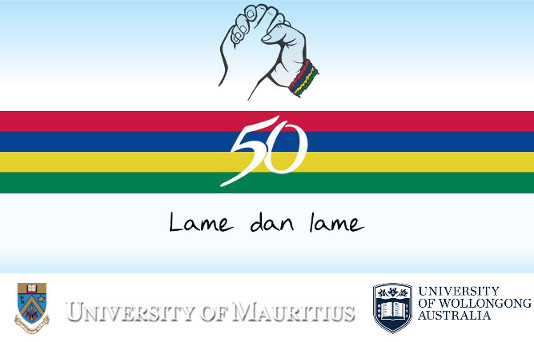Start Date
13-9-2018 10:30 AM
End Date
13-9-2018 11:00 AM
Description
Citation: Shameen Oozerally, Epistemological marginalization and research in language sciences: confessions of an anarchist, Lame dan lame? La main dans la main? Hand in Hand? Conference, University of Mauritius and University of Wollongong, 2019.
Abstract: Tensions between institutional discourse around ‘innovation’ and the realities intrinsic to research which aims to be innovative can have a direct impact on how the academic constructs his/her identity as a researcher. ‘Innovative research’ implies a certain level of epistemological and methodological rethinking, which does not necessarily sit well with established and conventionalized, and to some extent, ‘secure’ research practices. Venturing outside these epistemological, theoretical, and therefore, methodological edifices can be a tedious enterprise for the researcher, in terms of representations, support, and peer validation. This contribution, which is situated at the intersection of meta-methodology and auto-ethnography, aims to reflect on the methodological processes of a research project carried out in 2016-2017 in Mauritius: “Vers une modélisation complexe des pratiques (socio)langagières dans les écoles pré-primaires à Maurice : pistes, perspectives et implications”. The project in question aimed to model the language experienciation (Robillard 2008) of pre-primary children in Mauritius, through the lens of complexity theory, which breaks away from established research conventions. This research revealed a disarticulation between an ideal, founded on innovation and originality, and the reality which relies on a system of validation based on established conventions and rigidified methodological structures. The latter is often inspired by the paradigm of disjunction, reduction and unidimensionalisation (Morin, 2008). Research which detaches from such conventions is often marginalized, as it was the case for our project, and the researchers having taken part in it were labeled as ‘anarchists’. This contribution combines meta-methodology and auto-ethnography to reflexively and retrospectively returns to the research process to discuss the implications of an ‘anarchistic’ epistemological posture, which can often be marginalized by members of the academic community.
Epistemological marginalization and research in language sciences: confessions of an anarchist
Citation: Shameen Oozerally, Epistemological marginalization and research in language sciences: confessions of an anarchist, Lame dan lame? La main dans la main? Hand in Hand? Conference, University of Mauritius and University of Wollongong, 2019.
Abstract: Tensions between institutional discourse around ‘innovation’ and the realities intrinsic to research which aims to be innovative can have a direct impact on how the academic constructs his/her identity as a researcher. ‘Innovative research’ implies a certain level of epistemological and methodological rethinking, which does not necessarily sit well with established and conventionalized, and to some extent, ‘secure’ research practices. Venturing outside these epistemological, theoretical, and therefore, methodological edifices can be a tedious enterprise for the researcher, in terms of representations, support, and peer validation. This contribution, which is situated at the intersection of meta-methodology and auto-ethnography, aims to reflect on the methodological processes of a research project carried out in 2016-2017 in Mauritius: “Vers une modélisation complexe des pratiques (socio)langagières dans les écoles pré-primaires à Maurice : pistes, perspectives et implications”. The project in question aimed to model the language experienciation (Robillard 2008) of pre-primary children in Mauritius, through the lens of complexity theory, which breaks away from established research conventions. This research revealed a disarticulation between an ideal, founded on innovation and originality, and the reality which relies on a system of validation based on established conventions and rigidified methodological structures. The latter is often inspired by the paradigm of disjunction, reduction and unidimensionalisation (Morin, 2008). Research which detaches from such conventions is often marginalized, as it was the case for our project, and the researchers having taken part in it were labeled as ‘anarchists’. This contribution combines meta-methodology and auto-ethnography to reflexively and retrospectively returns to the research process to discuss the implications of an ‘anarchistic’ epistemological posture, which can often be marginalized by members of the academic community.



Comments
Bio: Dr Shameem Oozeerally is a Lecturer at the Mauritius Institute of Education (MIE). He holds a PhD in language studies and his research interests include complexity theory and epistemological and theoretical reconfigurations pertaining to multilingual studies. He also researches issues in Creole lexicography and language ecology.